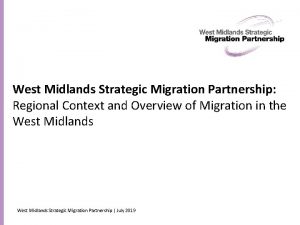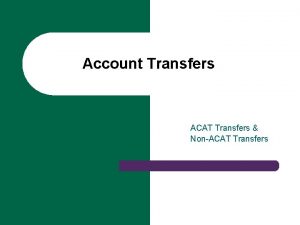West Midlands ADASS Delayed Transfers of Care The




- Slides: 4

West Midlands ADASS Delayed Transfers of Care The Current Position and Statement of Intent October 2018 Paul Johnston Impact Change Solutions for ADASS West Midlands (Oct 2017) Jacky Edwards & Raj Chauhan(FINAL)

West Midlands DTOC Introduction Jacky Edwards IEWM for ADASS West Midlands (Oct 2018) In October 2017 WM ADASS published a statement of intent, regarding improvements to Delayed Transfers of Care (DTo. C), the improvement intentions and the action plans to support improvement. This document refreshes that publication and sets out • WM ADASS 2018 Statement of Intent; • WM regional support and partners for change and improvement; • Headlines from analysis of the available data; • Data illustrations • The trend in reducing DTo. C in the West Midlands between November 2014 & July 2018; • The numbers of and reasons for delays between April 2014 & August 2018; • The daily average change in DTo. C bed numbers (all and ASC) per 100, 000 in August 2018; • A comparison of each WM Authority with WM peers and the overall West Midlands position; • The WM ADASS improvement framework and initial plan.

The WM ADASS DTOC Statement of Intent 2018 • We will work together in the best interests of local people, to support people to remain at home where-ever possible and to get back home as quickly as possible, after a hospital stay. Our ambition is to pro-actively continue to build relationships with health and other partners to deliver this aim. • We will maintain a collective regional approach that acts ambitiously with the aim of ensuring more and more people leave hospital without a delay, and their experience of the support provided by health and social care services during this time is positive. Individual Health and Wellbeing Board areas will take their own decisions on individual Delayed Transfers of Care (DTOC) trajectory improvements as part of BCF deliberations and local democratic processes. • Although there are significant financial challenges for Adult Social Care, we recognise that not all improvements require additional funding. There is a need to improve local leadership, management and/or operational practice, in both health and social care. We will take this into account in co-ordinating regional support. • We recognise the success to date and want to build on this. There has been an improvement trajectory in Adult Social Care (ASC) recorded delays since September 2016, with a further 19% improvement between April and July 2018. As of August 2018 only 34. 2% of total DTOC are now due to social care (42. 2% in July 2017), with 58. 90% attributable to the NHS (49. 9% in July 2017). The remaining 6. 9% are joint DTOC attributable to both (8. 4% in July 2017). • We shall build on the regional evidence that additional investment in social care using i. BCF funding and the latest Winter Funding from DHSC will continue to relieve some pressure on our NHS partners, whilst also recognising that this is in the context that most councils in the region continue to manage significant Adult Social Care savings plans and that improvements over the past 12 months have often been made through interim investment and time-limited projects and so may not be sustainable in the long term without a long-term funding solution. • Direct support will be provided to councils in our region who have particular performance, delivery or system relationship challenges around implementing key tools for change, such as BCF, the High Impact Change Model, Enhanced Health in Care Homes and CHC & Care Closer to Home. • We will facilitate ADASS representation at key regional planning, oversight or assurance meetings, and utilise the opportunity to improve the development of common purpose and common ambition with LGA and NHSE/I colleagues, wherever this is possible.

ADASS Regional Support& Partners • Analysis of the local DTOC targets being submitted in order to determine regionally the general picture, commonalities and issues. Also, what the impact on the regional performance would be, of our cumulative trajectories. • Proactive sharing and exchange of information and contacts utilising the WM ADASS Networks such as Performance & Knowledge, Commissioning and Continuing Health Care. • Building upon good joint regional relationships with health partners through WM Safe & Timely Transfers of Care Group (Sa. TTo. C), including • continuous development of the single version of the truth monthly Transfers of Care Performance Report; • input to specific regional improvement projects. • Working with the WM Health and Care Partnership Manager (formerly BCF Manager) to understand the impact of BCF/i. BCF investment & delivery plans and to raise the profile of the positive work of councils and their partners as part of this. • Linking into the WM Operational Hub (formerly Winter Room) to enable a shared understanding of local system and regional issues for all system partners and a proactive rather than reactive emergency response to initial information. • Specific support for areas who have significant issues on any aspect of improving the appropriate individual outcomes from safe, timely and effective transfers of care in and around their systems. • Regional workshops in partnership with others to consider and unblock, through constructive dialogue and creative thinking, the key issues arising from the planning and delivery of collaborative, integrated policy, strategy, process, and pathways to the benefit of the individual, their families and communities.







